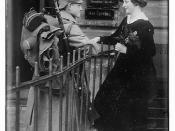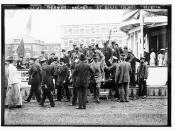After German foreign policy had caused the country to have hostile countries on either side - France and Russia - Germany needed a plan to win a war on two fronts. This plan was devised in the early twentieth century by Count Alfred von Schlieffen and then tinkered with fairly extensively by the younger Moltke right up until 1914. It is known as the Schlieffen Plan.
The plan's idea was to have a lightning invasion of France through the Low Countries while keeping light defensive forces on the Eastern Front with Russia, and when France was knocked out to turn the army to the East. It was based on the wars of the 1860s/1870s, which Germany had won: but what it forgot was that the enemy had come on a long way since then, as had technology, especially rapidly-firing machine-guns which favoured the defenders, and the use of rail for rapid military transport.
The plan relied on the Russians either being incompetent and slow to mobilize, or just deciding to sit tight; the French also being slow to mobilize; and the Belgians and Luxembourgers being totally submissive to the Germans coming through their countries. The Germans' enemies caused the Schlieffen Plan to fail: the Belgians resisted valiantly, putting the plan a crucial two days behind schedule. This Belgian resistance also meant that Britain joined the war against Germany, and that the British and French had just enough time to mobilize using the new automobile as well as rail transport. And the Russians gallantly but unpreparedly invaded East Prussia only a couple of weeks after the outbreak of war.
This briefly explains the immediate position Germany was in; now I shall go on to outline what this meant for Germany's prospects.
Firstly, the Schlieffen Plan had failed when the Germans,


